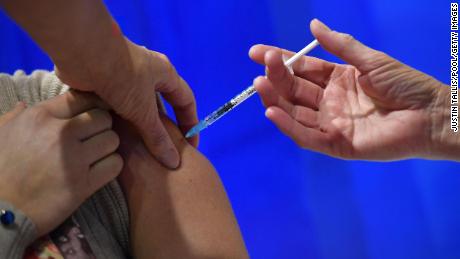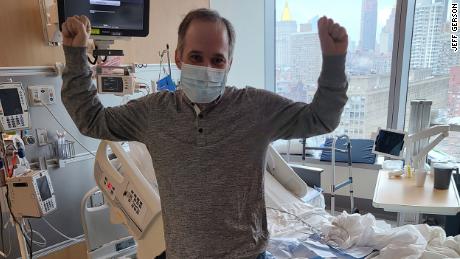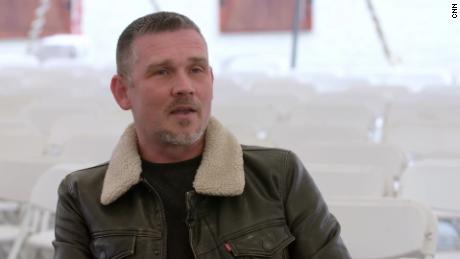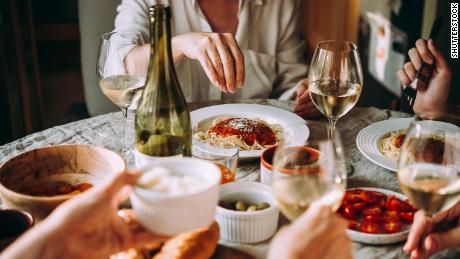First US vaccinations could happen as early as Monday or Tuesday, official says
Other key steps remain, but if those hurdles are cleared, the first vaccinations in the US could happen early next week, HHS Secretary Alex Azar told ABC’s George Stephanopoulos.
“The FDA informed Pfizer that they do intend to proceed toward an authorization for their vaccine,” Azar told ABC Friday morning.
HHS confirmed to CNN that Azar was referencing a tweet posted Friday morning that links to a news release from Drs. Stephen Hahn and Peter Marks of the US Food and Drug Administration. The release said the FDA told Pfizer it will “rapidly work toward finalization and issuance of an emergency use authorization.”
Key players in the vaccine decision process have been told to expect the FDA to issue the emergency authorization Saturday, according to a federal government source close to the situation.
The source cautioned that anything is possible, and the FDA decision could still come Friday.
That CDC advisory committee was meeting Friday afternoon and, if the FDA emergency authorization comes, it could meet again over the weekend about whether to recommend the vaccine.
Azar said the FDA would work with Pfizer to get the vaccine shipped “so we could be seeing people get vaccinated Monday, Tuesday of next week.”
Cases, hospitalizations and deaths soar
While a green light for a Covid-19 vaccine will offer hope, leading experts have warned the worst days of the pandemic are still ahead for the US. More case surges are likely to take shape as a result of Thanksgiving travels, and future holiday gatherings could drive numbers even higher, they say.
Cases, hospitalizations and deaths already are soaring:
• The US has averaged 210,201 new official Covid-19 cases daily over the past week — the highest average ever recorded for the country, according to Johns Hopkins University data.
• The county’s average number of deaths reported daily across a week was 2,259 Thursday, just below a pandemic peak reported a day before.
• This week also saw the most coronavirus deaths reported by the US in one day — 3,124, on Wednesday.
“We are in the time frame now that probably for the next 60 to 90 days, we’re going to have more deaths per day than we had in 9/11,” CDC director Dr. Robert Redfield said. “This is going to be a real unfortunate loss of life, as all that we’ve had so far, and the reality is the vaccine approval this week is not going to really impact.”
A CNN analysis of newly released data from the US Department of Health and Human Services showed that at least 200 hospitals across the US were at full capacity last week. And more than 90% of ICU beds were occupied in a third of all hospitals.
A timeline for the future
One of them, from Moderna, may be in line for an emergency use authorization later this month. The FDA advisory panel is set meet next week to consider whether to recommend this.
Another, from GlaxoSmithKline and Sanofi Pasteur, will be delayed until at least late 2021 after interim results showed “insufficient immune response” in the elderly, the companies said Friday.
Azar told ABC on Friday that the GSK/Sanofi delay won’t affect the United States’ expectation about how many Americans will be vaccinated by early 2021.
“We’re looking at 20 million Americans being vaccinated just in the next coming weeks (and) up to 50 million total by the end of January,” he told ABC. “We believe we could have 100 million actual vaccinations in arm by the end of February.”
At Chicago’s Rush University Medical Center, 10 vaccination stations have already been set up in a hallway, with temporary partitions. Hospital staff would get their Covid-19 vaccines there when doses arrive.
“I just feel like it’s a beginning of the end of this crazy pandemic, and it’s … nice to see it, frankly,” an RUMC respiratory therapist, Brady Scott, told CNN Friday. “It feels like a moment (where) we’re going to turn the curve and we’re going to get back to normal.”
It’s likely the US won’t see any meaningful, widespread impacts from vaccinations until well into 2021. But just how quickly the country can recover depends on how quickly Americans get vaccinated — and how many people are willing to get the vaccine.
“If we have a smooth vaccination program where everybody steps to the plate quickly, we could get back to some form of normality, reasonably quickly. Into the summer, and certainly into the fall,” Dr. Anthony Fauci, director of the National Institute for Allergy and Infectious Diseases, told CNN Thursday.
“My hope and my projection is that if we get people vaccinated en masse so that we get that large percentage of the population, as we get into the fall, we can get real comfort about people being in schools, safe in school — be that K-12, or college,” he added.
States and communities ramp up social restrictions
While the country anxiously awaits the first Covid-19 vaccine authorization, local and state leaders are responding to rising case rates by ramping up or extending social restrictions.
Ohio Gov. Mike DeWine announced Thursday the state is extending its statewide curfew until January 2, saying officials believed the curfew so far, along with face masks, have had an impact.
In Rhode Island, the governor extended a statewide “pause” on reopening one more week, saying the situation in the state was “getting scary.”
“In this crisis, we continue to lose Rhode Islanders every day and my heart goes out to each and every one of you who are struggling to get through this pandemic,” Gov. Gina Raimondo said Thursday. “Let’s stick to staying at home and honoring the pause one more week.”
In Florida, Miami said it will again enforce Miami-Dade County’s nightly curfew, starting this weekend, in response to a surge in coronavirus cases.
The county implemented the midnight-to-6 a.m. curfew earlier this year, but the city stopped enforcing it in October.
CNN’s Elizabeth Cohen, Ben Tinker, Deidre McPhillips, Adrienne Broaddus, Bill Kirkos, Amanda Watts, Melissa Alonso, Andrea Diaz and Tina Burnside contributed to this report.
![]()










